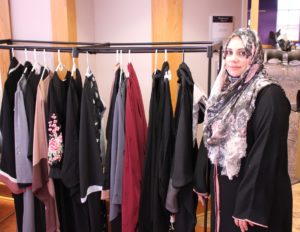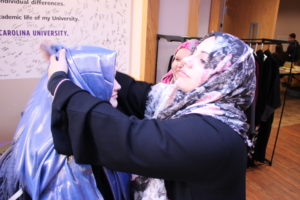Some people see the hijab, the religious clothing worn by Muslim women, as a symbol of oppression or violence. World Hijab Day seeks to change that. On Feb. 1, the WCU community took part in that education for the first time.
Social activist Nazma Khan founded the movement in 2013 with a goal, as stated on their website, to “foster religious tolerance and understanding” by inviting non-Muslim and non-Hijabi Muslim women to wear and experience it for one day.
Since its founding, World Hijab Day has grown in scope. Today, it is celebrated in around 190 countries worldwide. In NC, North Carolina State University held an event celebrating World Hijab Day.
World Hijab Day has been getting more and more official recognition since 2013. The New York State Senate recognized World Hijab Day in 2017. The House of Commons of the U.K. hosted an event recognizing the day in the same year. In 2018, the Scottish Parliament did the same over three days.

Natalia Sala at the WCU World Hijab Day booth. Photo taken by Tyler Davis.
WCU had its own event celebrating the day this year. Natalia Sala, an administrative support associate in the Center for Career and Professional Development, organized a booth in the University Center with information on the hijab and World Hijab Day.

Natalia Sala dressing a student in a hijab. Photo taken by Tyler Davis.
Students had the opportunity to wear the hijab with the assistance of Sala, who shared her story and experiences as a Muslim woman.
The World Hijab Day booth sought to dispel misconceptions of the hijab. Some believe that women are forced to wear the hijab or that it is mandated in all Muslim countries. According to Sala, very few countries mandate its wear, while some countries actually prohibit it.
“The majority of the women feel like we are wearing it as a form of liberation, not a form of oppression,” Sala explained. “And I don’t have a husband making me wear it or anything, it’s entirely by choice.”
According to Sala, most people are open-minded. “People who have judgments are actually in the minority.”
Religious clothing isn’t restricted to Islam. Sala explained that religious garb predates Islam. For example, Catholic nuns wear a similar dress to many Muslim women. Orthodox Jewish tradition and some Christian sects often encourage modesty among followers. Hindu women occasionally wear a dupatta, clothing meant to cover the hair.
If you would like to learn more information about World Hijab Day or get involved, click here.


